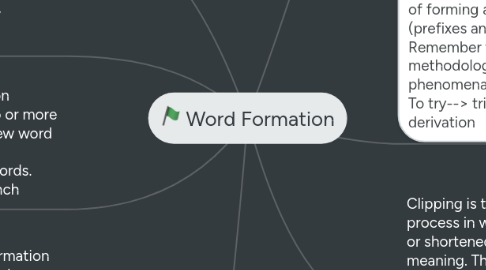Word Formation
저자: maria rosa piranio

1. Blending is the word formation process in which parts of two or more words combine to create a new word whose meaning is often a combination of the original words. E.G. breakfast + lunch → brunch
2. Compounding is the word formation process in which two or more lexemes combine into a single new word. Compound words may be written as one word or as two words joined with a hyphen. Compounds may be compositional, meaning that the meaning of the new word is determined by combining the meanings of the parts, or noncompositional, meaning that the meaning of the new word cannot be determined by combining the meanings of the parts. For example, a blueberry is a berry that is blue. However, a breakup is not a relationship that was severed into pieces in an upward direction .Compound nouns should not be confused with nouns modified by adjectives, verbs, and other nouns. For example, the adjective black of the noun phrase black bird is different from the adjective black of the compound noun blackbird in that black of black bird functions as a noun phrase modifier while the black of blackbird is an inseparable part of the noun: a black bird also refers to any bird that is black in color while a blackbird is a specific type of bird.
2.1. noun-noun compound: note + book → notebook
2.2. noun-noun compound: note + book → notebook
2.3. verb-noun compound: work + room → workroom
2.4. noun-verb compound: breast + feed → breastfeed
2.5. verb-verb compound: stir + fry → stir-fry adjective-verb compound: high + light → highlight
2.6. verb-preposition compound: break + up → breakup
2.7. preposition-verb compound: out + run → outrun
2.8. adjective-adjective compound: bitter + sweet → bittersweet
2.9. preposition-preposition compound: in + to → into
3. Acronymy : the first letters of a series of words pronounced as one word. MP = Member of Parliament/ PM=Prime Minister
4. Loawords are words borrowed from other languages and hardly changed. Sushi, Judo, a priori.
5. Calque is a loan translation, especially one resulting from bilingual interference in which the internal structure of a borrowed word or phrase is maintained but its morphemes are replaced by those of the native Language. Examples are the days of the week monday: the day of the moon/ thursday: the day of Thor (God similar to the Roman god Juppiter).
6. Affixationation/derivation is the act of forming a word by adding affixes (prefixes and suffixes) to a word. Remember that in ESP this methodology can generate phenomena of semantic shifts. (e.g. To try--> trial) known also as zero derivation
6.1. Nominalization: -er: teach-->teacher/ ee: to employ--> employee (diverso da employer)/ -tion: communicate --> communication/ -ist psycology--> psycologist/ -ism: Marx--> Marzism.
6.2. Adverbialization: Rare --> Rarely.
6.3. Adjectivalization: -ful: beauty--> beautiful/ -ish: fool-->foolish/ -ive addict--> addictive/ -ing: love--> loving.
6.4. Verbification: Google --> to google
7. Clipping is the word formation process in which a word is reduced or shortened without changing its meaning. This process is also called truncation or shortening. laboratory-->Lab
7.1. Back Clipping:Cablegram-->cable
7.2. Middle Clipping: refridgeratore-->fridge
7.3. Fore Clipping telephone-->phone


